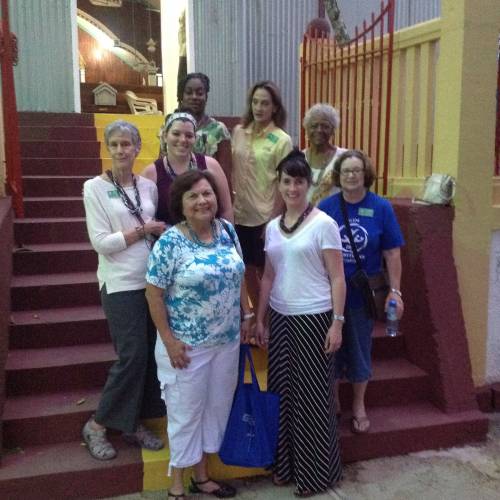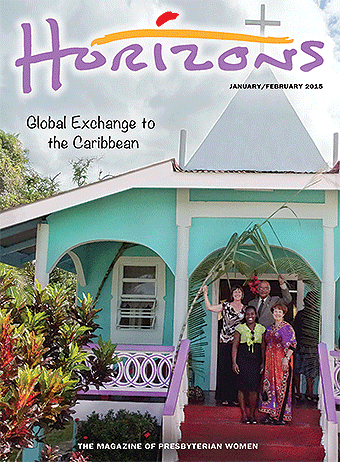A letter from Jo Ella Holman serving as Regional Liaison for the Caribbean region, based in the Dominican Republic
March 2015
Write to Jo Ella Holman
Individuals: Give online to E200376 for Jo Ella Holman’s sending and support
Congregations: Give to D507535 for Jo Ella Holman’s sending and support
Churches are asked to send donations through your congregation’s normal receiving site (this is usually your presbytery).
I’m going home in the morning train.
I’m going home in the morning train.
I’m going home in the morning train,
For the evening train it be too late.
So sang one of our hosts from the Women’s Association of the Iglesia Evangélica Dominicana (IED)—in English, no less. Our group of eight U.S. Presbyterian Women (PW), who were part of a Global Exchange with sisters in the Caribbean, was joined by two national Dominican Women’s Association officers and me to explore and learn together about the country, the church, and some pressing social issues.

Praise with the PW group
Our journey started in Jamaica with a gathering of PW representatives of PC(USA) synods and Caribbean sisters from Jamaica, Surinam, Cuba, Grenada, and Trinidad/Tobago. Our host for the Exchange was CANACOM, Caribbean and North American Council on Mission, of which the PC(USA) is a member church. In Jamaica our orientation focused on several issues important in the Caribbean region and in the U.S. Presbyterian World Mission is focusing on three critical global initiatives: addressing root causes of poverty, sharing the good news of Jesus Christ, and reconciliation. The CANACOM-member church priority topics correspond to these three critical issues in their specific Caribbean context: Reconciliation—prevention and response to human trafficking and violence against women and children; Addressing root causes of poverty—not only providing assistance to those in need, but beginning micro-enterprises and providing clean water; and Sharing the good news of Jesus Christ—church growth strategies and women in church leadership.
The women divided into groups to visit sisters in three countries to explore these themes together: Curaçao, the Dominican Republic, and Guyana. Each group was hosted by the women of a CANACOM-member church, and I accompanied the group back to my home base, the Dominican Republic (DR).
 Part of our journey in the DR took us to the northeastern peninsula of Samaná, where the women shared with us about poverty issues. There is chronic unemployment or underemployment in most of the country, especially for the women. This situation puts great pressure on the families for feeding their children, paying for school uniforms and supplies, clothing, all that is required for a family. One of the women’s micro-business projects to raise their own livelihoods and for their church programs is baking bread. What an experience! Baking bread outside in large pots over open fires!
Part of our journey in the DR took us to the northeastern peninsula of Samaná, where the women shared with us about poverty issues. There is chronic unemployment or underemployment in most of the country, especially for the women. This situation puts great pressure on the families for feeding their children, paying for school uniforms and supplies, clothing, all that is required for a family. One of the women’s micro-business projects to raise their own livelihoods and for their church programs is baking bread. What an experience! Baking bread outside in large pots over open fires!
We gathered with the women at the mother church of the peninsula, St. Peter’s. The original Wesleyan Methodist congregation emigrated to Samaná from England and brought their church building with them! The reconstructed church building still stands on a knoll overlooking the beautiful Bay of Samaná, where each winter Atlantic whales come to spawn and tourists arrive to see them.
We learned that Methodists weren’t the first English-speakers to settle in the north part of the island. Francis Drake and other English pirates and bucaneros used the north coast as bases for raiding the ships of other countries plying the Caribbean waters in the 16th century. The original English Methodist congregation was joined by freed slaves, primarily from Philadelphia, who began settling on this island of Hispanola in 1824 under an agreement with the U.S. Colonization Society that promoted immigration of free blacks to Africa and to Haiti. They estimate that 5,000 to 6,000 free blacks immigrated from the U.S. to Hispanola.
Samana still has a large number of English-speakers from this tri-fold English history and an inheritance from the U.S. blacks who settled there. We participated one evening in what they called “games,” juegos, which are chants or songs with dancing, straight from the U.S. free black settlers. Think of a super-lively version of “Farmer in the Dell.” Many of the songs sung in the Samaná IED churches are spirituals brought by their ancestors, like the one our new friend sang to us in English, “I’m going home on the morning train, for the evening train, it be too late.”
You can read all about the Global Exchange and the issues discussed in the January-February issue of Horizons magazine. And you can meet many of our Caribbean sisters at this summer’s Churchwide Gathering of Presbyterian Women in Minneapolis. Come join us to learn some new songs, taught by Jamaican sister Rev. Nicole Ashwood, and learn about the issues we explored together. Or invite your synod’s PW Global Exchange participant to speak to your congregation or presbytery. They are waiting for your invitation!
I send a hearty thanks to each one of you and each congregation and presbytery that supports me and my ministry in the Caribbean. You give me the enormous privilege of accompanying the women of the Caribbean and the partner churches and seminaries of this region through your prayers and your financial gifts. Thank you! And if you are not already a supporter, won’t you support my ministry or that of another PC(USA) mission co-worker in the Caribbean? We would love to introduce you to the rich history and the vibrant faith of the people of this beautiful part of the world.
Jo Ella
2015 Presbyterian Mission Yearbook for Prayer & Study, p. 44
![]() You may freely reuse and distribute this article in its entirety for non-commercial purposes in any medium. Please include author attribution, photography credits, and a link to the original article. This work is licensed under a Creative Commons Attribution-NonCommercial-NoDeratives 4.0 International License.
You may freely reuse and distribute this article in its entirety for non-commercial purposes in any medium. Please include author attribution, photography credits, and a link to the original article. This work is licensed under a Creative Commons Attribution-NonCommercial-NoDeratives 4.0 International License.